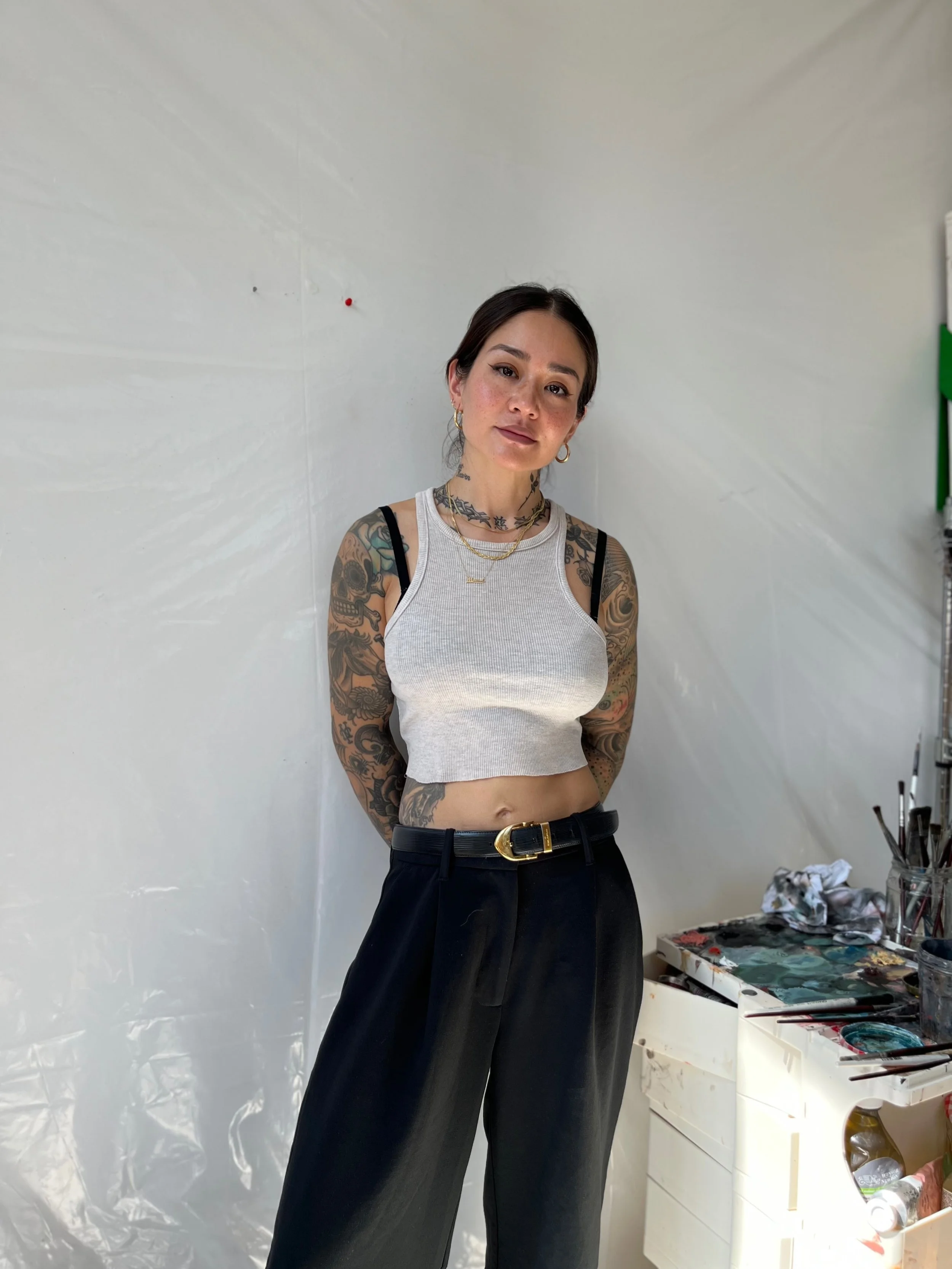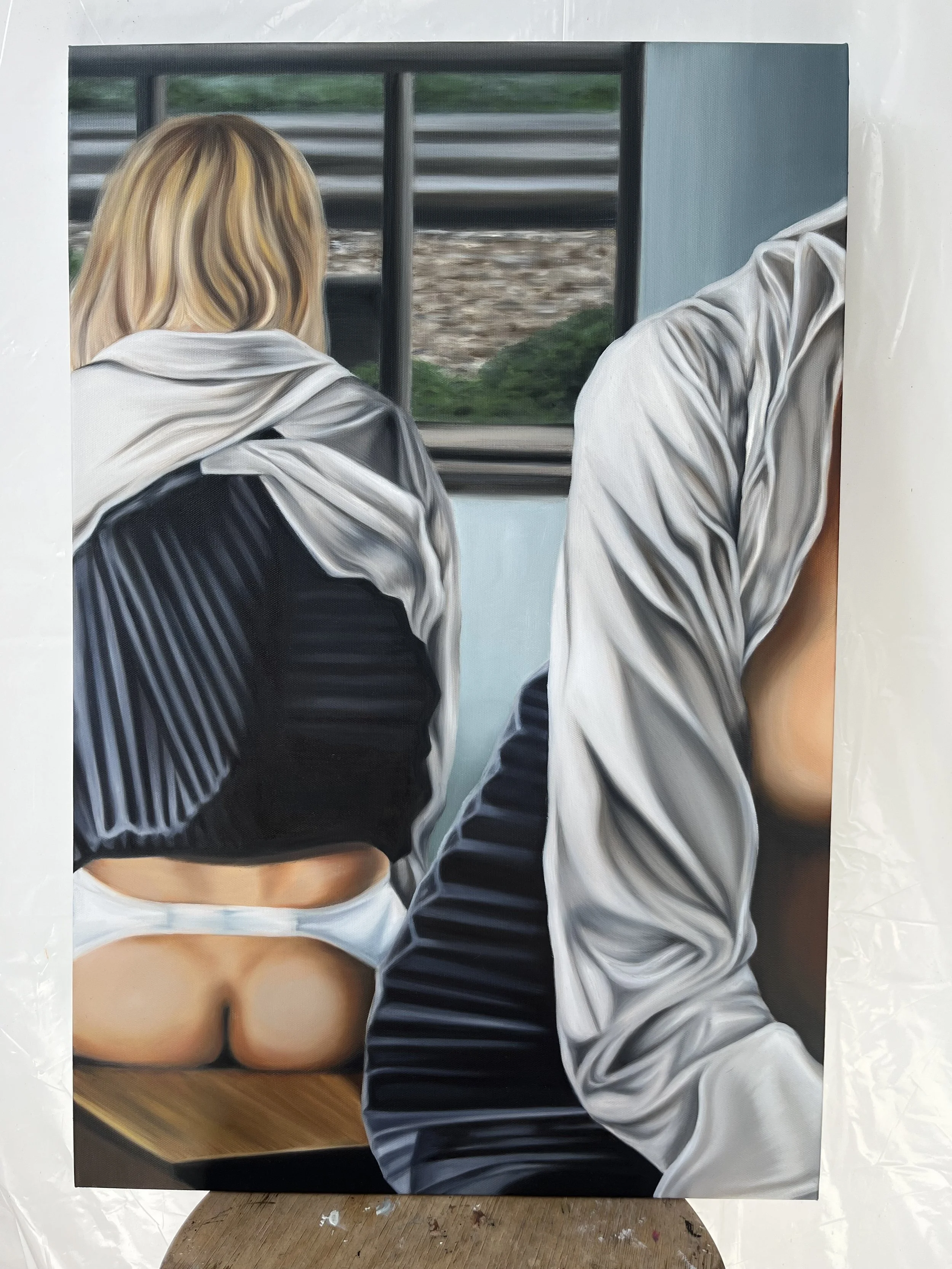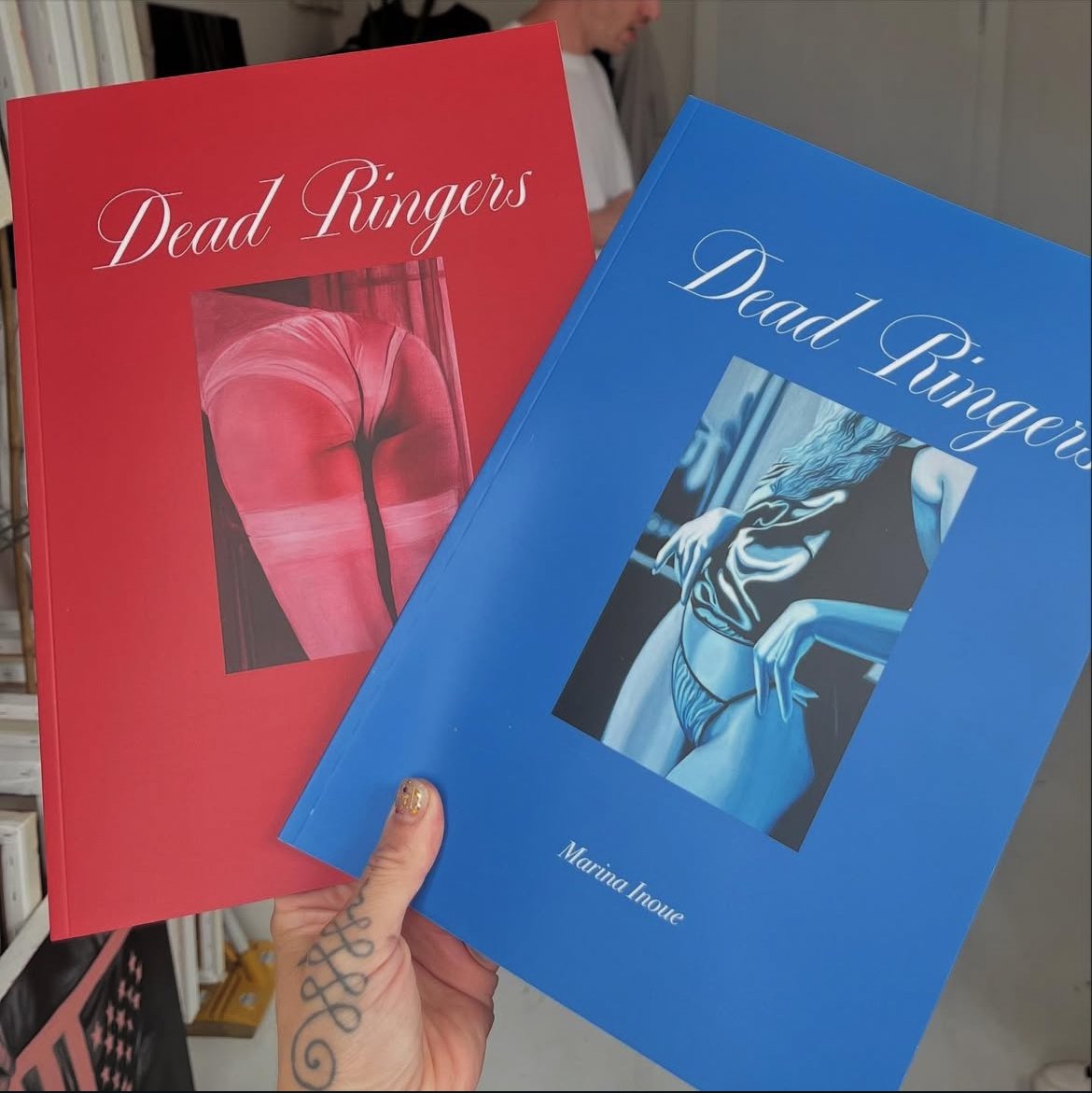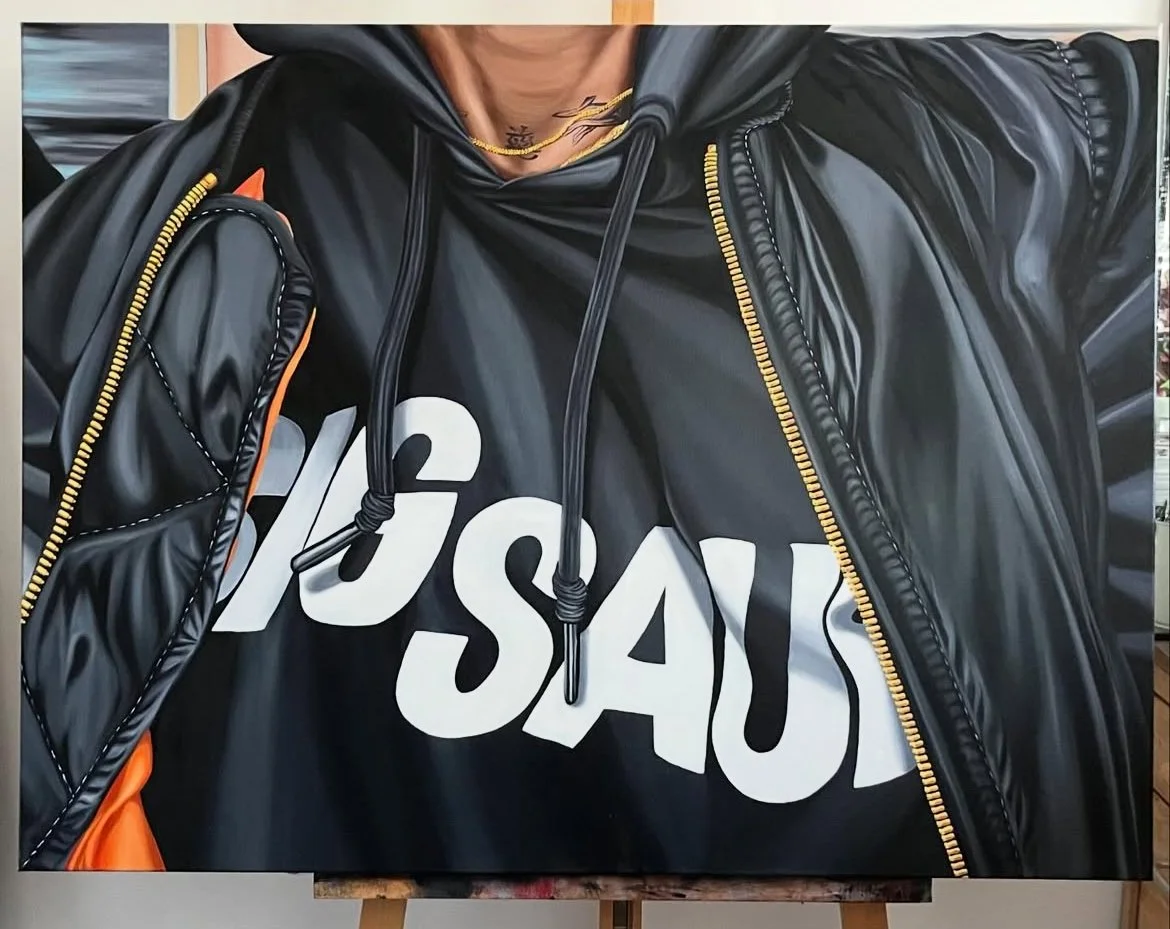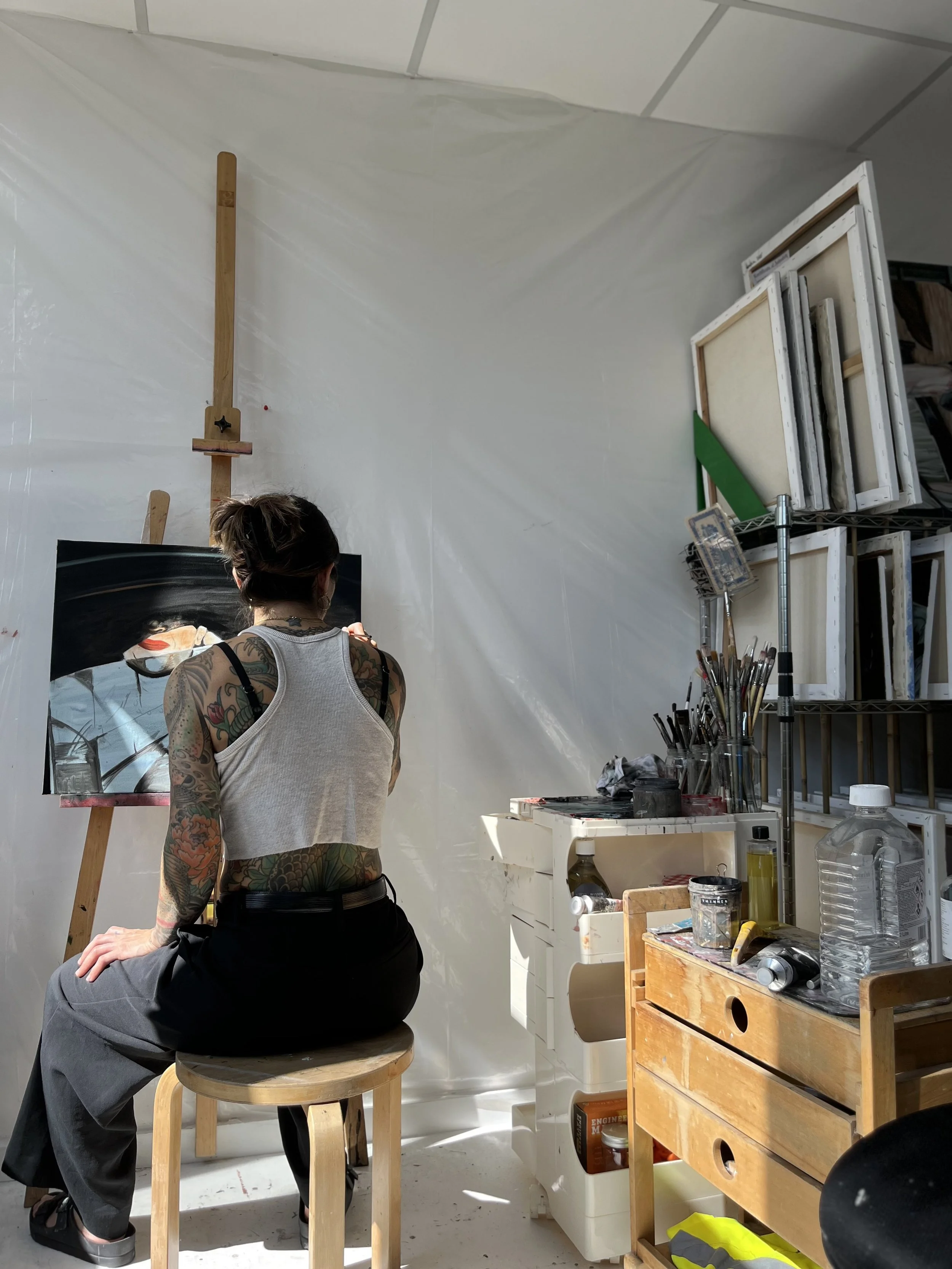Ep.4 Marina Inoue
Tattoo Artist & Oil Painter
Introduction
ニューヨーク出身のタトゥーアーティスト兼油彩画家のマリーナ・イノウエは、幼少期からパンクやハードコアのライズに足繁く通い、サブカルチャーに対する深い造詣を培う。
-19歳のとき、ブルックリンの"Flyrite Studios"で見習いとしてキャリアをスタート。独立後は、黒とグレーを基調とした大胆かつ誠実なラインワークを駆使し、権力構造、恐怖、トラウマの回復とセクシュアリティや快楽との関係といったテーマをアメリカントラディショナルのスタイルに落とし込んでいる。
2023年にはロンドンに拠点を移し、タトゥーに加えて油彩画の制作も本格的に始める。"自身への内面の探究心"のみに従い生み出される彼女の作品たちは、単なる絵画という枠を超え、彼女自身を映し出す鏡とも言えるだろう。
-New York-born tattoo artist and oil painter Marina Inoue frequently attended punk and hardcore festivals from a young age, cultivating a deep knowledge of subculture.
At the age of 19, she began her career as an apprentice at "Flyrite Studios" in Brooklyn. Using bold yet honest linework based on black and gray, she has since incorporated themes such as power structures, fear, and the relationship between trauma recovery and sexuality and pleasure into her traditional American style.
In 2023, she will relocate to London, where she will begin full-time oil painting in addition to tattooing. Her works, created solely out of a desire for inner self-exploration, transcend the boundaries of mere painting and serve as a mirror that reflects her own self.
15Questions
Q 1. 伝統的な徒弟制度のもとで修行されたと伺いました。そのような厳しい環境で、タトゥーアーティストとしての道を歩み続けた動機は何ですか?
-タトゥーアーティストになりたかったという強い思いがあり、そのためなら何でも犠牲にするつもりでした。
良くも悪くも、自分の仕事に対する倫理観には常に誇りを持っていたので、この挑戦は私にとって非常に大きな挑戦でした。
Q 1. I heard you trained under the traditional apprenticeship system. What motivated you to continue on your path as a tattoo artist in such a harsh environment?
-I wanted to be a tattooer so badly that I was willing to sacrifice anything for it. I have always prided myself on my work ethic- for better or worse- so the challenge was something I was more than willing to undertake.
Q 2. タトゥーを通 して、どのように自分の「アイデンティティ」を表現していますか?
-どんなタトゥーを彫りたいのか、どんな見た目にしたいのかを考えるのに長い時間がかかりました。タトゥー以外の参考資料を参考にし、それらのイメージをタトゥーとして描き直す方法を学び始めてから、ようやく自分自身を見つけたような気がしました。そして、主に黒とグレーを使っています。黒とグレーには真剣さがあり、それが私の美的嗜好に合っていると思います。
Q 2. How do you express your own "identity" through tattooing?
-It’s taken me a long time to figure out what sort of tattoos I want to do, and how I want them to look. Only when I started leaning into using non-tattoo related reference and learning how to re-draw those images as tattoos did I feel like I found myself more, as well as mainly using black and grey. I think there is a seriousness with black and grey that lends itself more to my aesthetic preferences.
Q 3. デジタルツールが普及した現代においても、あなたが大切にしている「アナログ技法」や「時間のかかる手法」はありますか?
-私の絵画は油彩で、おそらく最も伝統的で時間のかかる芸術形式の一つです。キャンバスに画像を投影するためにプロジェクターは使用しますが、デジタル加工した画像は使用していません。AIやPhotoshopも一切使用していません。参考資料はすべて写真です。とはいえ、私は最も伝統的な油彩画家ではないし、それらを学んだことがなく独学なので最も手間のかかる技法はあまり使いません。
しかし、私が油彩を選んだのは、時間をかけて、具体的に、そして実際に手を動かしながら制作できる、価値のある媒体で制作したいと思ったからです。ますますデジタル化が進む現代において、アナログなプロセスは私にとってデジタル化からの脱出のように感じられます。
Q 3. Even in this age where digital tools have become commonplace, are there any "analog techniques" or "time-consuming methods" that you choose to preserve?
-My paintings are oil, which is perhaps one of the most traditional and time consuming forms of art. While I do use a projector to get the image on to the canvas, I don’t use digitally manipulated images, so no AI or even photoshop. All of my references are from sourced photographs. That being said, I am not the most traditional of oil painters- I am self-taught and don’t often use the most laborious techniques simply because I never learned them.
But, I chose to work in oil because I really wanted to work in an esteemed medium that would force a slow process, something very tangible and hands-on. For me, in a world that is increasingly digital, the analogue process feels like an escape.
Q 4. 画家として「キャンバス」に描くことと、タトゥーアーティストとして「肌」に描くことの間には、思考や意識にどのような違いがありますか?
-そうですね、絵画は自分のために描いています。時間をかけて、失敗しても、実験して、学び、何かを塗り重ねて、探求することができます。一方、タトゥーは誰かのために描き、できる限り完璧に仕上げるための一発勝負です。
Q 4. What differences in thought and awareness are there between working on a "canvas" as a painter and working on "skin" as a tattoo artist?
-Well, with painting I’m doing it for myself. I can take my time, mess up, experiment, learn, paint over something, explore. With tattooing, it’s for someone else and it’s one shot to make it as perfect as possible.
Q 5. 表現手段をタトゥーから絵画に移行したことで、どのような新しい洞察や技術的な発見がありましたか?
-私にとって、絵を描くことは自分の思い通りに描くことが本当に重要です。タトゥーは多かれ少なかれ商業芸術です。最も複雑なレベルでは、基本的に誰かが自分専用のデザインを依頼するようなものです。最も単純なレベルでは、誰かが持ってきたデザインを、変更や意見を一切加えずに複製するだけです。
絵画に関しては、誰かのために仕事をしているような気がするので依頼の仕事は受けません。自分が描きたいものだけを描くことにこだわっています。よって完全な自由と柔軟性を持つことが出来ます。その後は、人々がそれを受け入れるか拒否するかは自由です。
Q 5. As you shifted from tattooing to painting as your medium of expression, what new insights or technical discoveries have you made?
-It is really important to me that painting is on my own terms. Tattooing is more or less a commercial art. At the most involved level, someone basically hires you to do a custom design for them. At the least involved level, you are doing a replication of a design someone brings in with no alteration or input.
With painting, I don’t do commission work because it feels too close to working for someone else. I am insistent that I only paint what I want to paint, so I am able to have full freedom and flexibility. People can take it or leave it after that.
Q 6. これまでの創作活動を通して、一貫して大切にしてきたテーマ、コンセプト、あるいは表現の核となるものはありますか?
-スタイル的には幾多の段階を経てきましたが、私の核となるエネルギーの多くは、常にパンクのルーツから来ていると感じています。一般的には反社会的、規範から外れていると見なされるような、人々に不快感を与えたり、何を見ているのか、なぜ見ているのか疑問に思わせるようなビジョンや世界を創造することに興味があります。
Q 6 . Is there a theme, concept, or core of expression that you have consistently valued throughout your creative endeavors to date?
-While I have gone through many, many phases stylistically, I do feel like much of my core energy always comes from my punk roots. I am interested in creating visions and worlds that would generally be considered anti-social, outside of the norm, made to make people feel uncomfortable or question what they are looking at and why.
Q 7. あなたの作品によく登場する「ゴム」のモチーフには、どのような意味があるのでしょうか?それはあなたにとって「シグネチャー」(特別なもの)のようなものですか?
-あの布地には、フェティッシュ文化の素材、特にゴムへの個人的な関心が確かに表れています。 ゴムの見た目、そしてそれが持つ威圧感と性的魅力の両方が好きです。
Q 7 . What meaning is there in the "rubber" motif that often appears in your work? Is it like a "signature" (something special) to you?
-There is definitely a signifier with those textiles- a personal interest in the materials of fetish culture, specifically rubber. I love the way the material looks, how it can be both menacing and sexualized.
Q 8. タトゥーを入れようか迷っている人に、どんな言葉をかけますか?また、タトゥーを入れる際に心に留めておいてほしいことがあれば教えてください。
-ええと、タトゥーにはいくつかのアプローチがあります。タトゥーは根本的にあなたの人格を変えるものではありません。ですから、何を入れるか悩むのは時間の無駄だと思います。タトゥーはあなたの一部となり、しばらくすると忘れてしまうので、実際にはそれほど大きな問題ではありません。
しかし、タトゥーをあなたの永遠の一部として尊重し、タトゥーを職業として尊重することも重要です。誰にタトゥーを入れてもらうか、よく考えることも重要です。
Q 8 . What words would you say to someone who is undecided about getting a tattoo? Also, please let us know if there are any perspectives you would like people to keep in mind when getting a tattoo.
-Well, it can be approached a few different ways. A tattoo doesn’t fundamentally change who you are, so to agonize over what to get can be a waste of time, in my opinion. They just become a part of who you are and you sort of forget about them after a while, so it’s not too big of a deal really.
But, it is also important to respect tattoos as a permanent part of you, and to respect tattooing as a trade. Making good choices about who to get tattooed by is also critical.
Q 9 . タトゥーを入れることで表面的な変化がもたらされるだけでなく、人生にどのような内面的な変化や影響を与えると思いますか?
-人生への影響は、人それぞれです。私にとって、タトゥーをたくさん入れることは、自分の体に責任がある、つまり自律性があり、自分自身のためだけに選択をしているという文化的象徴です。特定のタトゥーは、まるでお守りのように、より力強く感じさせてくれます。
また、西洋では2025年になっても、特に女性の場合、タトゥーをたくさん入れることは比較的反社会的な印象を与えます。私はそれが気に入っています。とはいえ、私はタトゥーがあってもなくても同じ人間です。タトゥーを入れている時間が長くなればなるほど、タトゥーが私を定義づけているという感覚は薄れていきます。
Q 9 . Beyond the superficial changes that getting a tattoo brings about, what kind of internal changes and impact do you think it has on one's way of life?
-It can have as much or as little of an impact as someone wants on their life. For me, being very tattooed is a cultural signifier that I am in charge of my own body- that I have autonomy and have made choices for myself and myself only. I think that certain tattoos I have make me feel more powerful, like a talisman.
It is also still a relatively anti-social presentation, even in 2025 in the western world, to be very heavily tattooed, especially as a woman- which I like. That being said, I am the same person with or without tattoos. The longer I have them, the less I find that they define me.
Q 10 . K.T.KOBELは、最近東京で個展を開催しましたね。以前、アートブックの共同制作をされましたね。一緒に仕事をするようになったきっかけや、思い出に残るエピソードがあれば教えてください。
-彼の最近の展覧会、すごく良かったでしょう? 彼の作品は、共通の知り合いで、彼の作品を出版していたPaperworkのMikeを通して知りました。彼はアムステルダムに住んでいるので、私がロンドンに引っ越した時に直接会う機会があり、芸術面でも友人としても、本当に特別な絆を育むことができました。仕事でもプライベートでも、このように深い関係を築ける人に出会えることは滅多にありません。本当に幸運だと思います。アイデアを交換したり、不安を打ち明け合ったり、冗談を言い合ったり、偏見なく分かち合ったりできる友人がいることは、信じられないほど助けになります。
私たちは共通の興味をたくさん持っており、それが、精神異常の双子のつながりというコンセプトに基づいた「Dead Ringers」という本のアイデアにつながったのです。彼には、彼の半分の作品に使う参考資料となるファイルを送りました。そして彼も彼と同じように、写真集に掲載されているそれぞれのページの写真でさえ、私たちが目隠しをした交互に組み合わせたのですが、まさに互いを映し出していました。彼との仕事は私に多くのことを与えてくれました。
Q 10 . K.T.KOBEL recently held a solo exhibition in Tokyo. You previously collaborated on an art book. Could you tell us how you came to work together and if there were any memorable episodes?
-The exhibition he just had was so good, wasn’t it? I found his work through a mutual acquaintance- Mike from Paperwork- who had published some of his work. He lives in Amsterdam, so when I moved to London, we got to meet in person and have cultivated a really special kinship, both artistically and as friends. It is very rare to come across people that you can find that kind of working and personal relationship with, and I feel very lucky. To have a friend to exchange ideas with, to come to with insecurities, to joke with, to share without judgement, it’s unbelievably helpful.
We have a lot of shared interests, which spurned the idea of the Dead Ringers book, based on the concept of a psychotic twin connection. I sent him a file of reference to pick from for his half of the paintings, and vice versa- even our individual pages of photos in the book- which we put together blind and independently- really mirror each other. Working with him has given me so much.
Q 11. 画家として自分を表現し始めたきっかけは何ですか?キャリアにおける転機があったら教えてください。
-過去にはガッシュと水彩で絵を描いたことはありましたが、本格的に描いたことはありませんでした。ロンドンに引っ越した頃は、タトゥーを入れるのにとても時間がかかりました。仕事が進まないのはストレスで、ひどく落ち込み、新しい、寒くて暗い国で自分自身を見つけるのに苦労していました。本当に辛い時期でした。
私は、何かに集中しないと生きていけないタイプの人間です。この時期は、人生の新たな章で時間をどう過ごすかを考える機会となり、油絵を始めようと思いました。油絵には神秘的な魅力があり、長い歴史と敬意が込められており、そして非常に難しいことでも知られています。こうしたことが、私に挑戦してみたいという気持ちにさせてくれました。そして、2024年2月にスタジオを見つけ、絵を描き始めました。
Q 11. What inspired you to start expressing yourself as a painter? Could you tell us if there was a turning point in your career?
-I’ve painted with gouache and watercolor in the past, but never seriously. When I moved to London, tattooing was very, very slow for me. It was stressful to be so slow at work, I was deeply depressed and struggling to find myself in a new, cold, dark country. It was a very hard time, and I am the kind of person who needs something to focus on in order to function.
This time period gave me the chance to think about what I could do to fill my time in this new chapter of my life, and I really wanted to start oil painting. There is a mystique about it, with so much history and respect, and being so notoriously difficult- these things made me want to challenge myself and try it. I ended up finding a studio and started painting in February of 2024.
Q 12. これまでの作品の中で、特に印象に残っている作品とその背景にあるストーリーはありますか?
-正直なところ、すべてがまだ私にとって新鮮で、描く絵はどれも最も記憶に残る作品のように感じます。描くたびに、制作過程と自分自身について、何か新しいことを学びます。今でもお気に入りの絵の一つは、絵を描き始めた頃の初期の作品です。
電車に乗っている自分の自画像で、アメリカに住んでいた頃に見つけたSIG SAUER(シグ・ザウエル)のスウェットシャツを着ています。ユタ州に住んでいた頃、SIG SAUER(シグ・ザウエル)の銃器を所有していたので、このスウェットシャツはアメリカ人のアイデンティティを象徴する典型的な砦のように感じます。そこからロンドンでの孤独感を表現して、「The American Disaspora(アメリカの離散)」と題しました。
Q 12. Of the works you have created so far, is there a particularly memorable one and the story behind it?
-To be honest, everything is still so new to me that I feel like every new painting I make is the most memorable one. With every painting, I learn something new, both about the process and about myself.
One of my favorite paintings that I’ve done to this day though is an earlier one from when I first started painting. It is a self-portrait of myself riding the train, featuring an Sig Sauer sweatshirt that I found when back when I was living in America. I owned Sig Sauer firearms when I lived in Utah, and the sweatshirt feels like a stereotypical bastion of an American identity. I titled it “The American Diaspora” , a nod to feeling isolated in London.
Q 13. アーティストとしてのキャリアの中で、この道を選んで良かったと感じた瞬間や、誇りに思えた出来事について教えてください。
-スタジオに入った瞬間、とてもホッとしました。自分だけの奇妙な小さな世界を創造できる自分の空間を持つことは、私にとって大きな意味を持っています。タトゥーショップでの仕事に加えて、週に20~30時間はそこで過ごしています。
もちろん、作品を展示したり、販売したり、キャリアを築いたりしたいですが、スタジオで頭に浮かんだことを何でもできるというのは、私にとってかけがえのないものです。
Q 13. In your career as an artist, could you tell us about a moment that made you realize you were glad you chose this path or an event that made you feel proud?
-The moment I moved into my studio I felt so relieved. Having my own space where I can create my own, weird little world has meant so much to me. I probably spend about 20-30 hours in there a week, on top of working at the tattoo shop.
Of course I would love to show, sell paintings, have a career, but being able to be in the studio doing whatever comes out of my brain has been priceless for me.
Q 14. 作品や活動を通して、社会にどのような影響を与えたいと考えていますか?また、作品を通して伝えたい社会的なメッセージがあれば教えてください。
-これまで、政治的なコミュニティを軸にした作品を数多く制作してきましたが、アートにおいては、内面を探求することに興味があります。
私の作品の多くは、権力構造、恐怖、トラウマの回復、そしてそれらとセクシュアリティや快楽との関係といった概念を探求しています。あからさまに政治的なアートを押し付けることには興味がありませんが、その根源は本質的に政治的だと考えています。
Q 14. What kind of impact do you hope to have on society through your work and activities? Also, please tell us if there are any social messages you would like to convey through your art.
-I’ve done a lot of political community driven work in the past, but with art, I am interested in exploring internally.
A lot of my work explores the concepts of power dynamics, fear, reclamation of trauma, and the relation of those things to sexuality and pleasure. While I don’t have any interest in pushing across overtly political art, I think that the source of that is inherently political.
最後に、未来を担う若者たちへのメッセージをお願いします。
- 芸術は、人類が生み出せる数少ない純粋なものの一つだと私は信じています。自分の想像力だけで何かを創造すること、特に自分の手で何かを創造することは、人類の精神的な生存にとって非常に重要です。
私たちのほとんどは、生きていくため、お金を稼ぐために、資本主義的な意味で働かなければなりません。それは人生における最大の悲劇の一つです。私は、心に浮かぶあらゆる創造的なことを、常に追求するよう皆さんに奨励したいと思います。
Finally. Please give a message to the young people who will be responsible for the future.
-I believe that art is only of the only pure things humanity is capable of. Creating something completely out of one’s imagination- especially when it is made by your own two hands- is so important for the spiritual survival of mankind.
Almost all of us have to work in the capitalist sense to survive, to make money, and that is one of the biggest tragedies of being alive. I would just always encourage people to pursue everything and anything creative that they have in their minds.
2025.11.13
Guest
Marina Inoue
Artworks Tattoo studio
ALTERNATIVEMORALITY
Online Shop https://alternativemorality.bigcartel.com/
Credits
Interview / Words:Shuto Sasaki
Translation:YeMin


